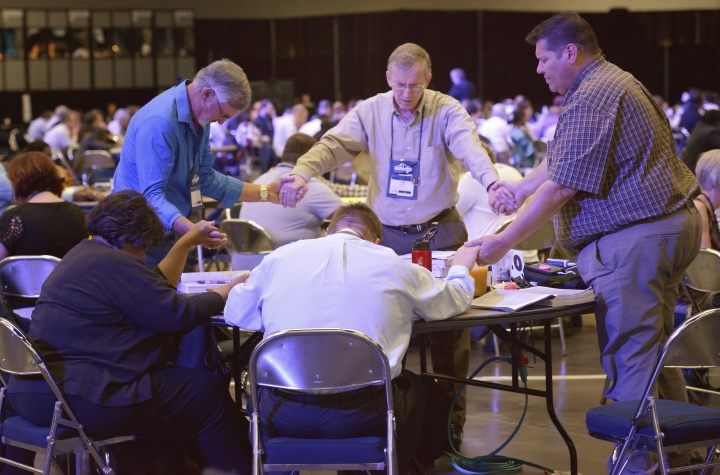news article

Americans are more polarized than ever. We United Methodists don’t want to be.
May 20, 2016 / By Tom Berlin and Mike McCurry
In an ever-more-polarized society, the United Methodist Church this week has tried to model an approach to disagreement that the U.S. political system would do well to emulate.
Despite deep differences over gay marriage and whether gay men and lesbians can be ordained as clergy, we are working hard at our once-every-four-years meeting to stay united as we search for solutions. Like Americans, we United Methodists have a common history to draw upon as we persevere together.
Members’ intense drive to remain together in the face of difference seems to stand out as many other once-dependable American institutions — such as our political parties — seem ready to fracture.
[With talk of schism over gay issues, United Methodists vote to pursue a new way of being]
For the past 10 days, our global denomination has been at our General Conference, United Methodism’s top policy-making session. Unity in our “united” church has been sorely tested by the topic of sexuality, which has threatened to boil over at every quadrennial gathering of the Methodists since 1972.
This time, when 864 delegates from around the world gathered in Portland, Ore., discussion of “schism” and “separation” hovered in the air.
Embracing a broad ideology and theology on a topic like homosexuality is complicated for Methodists because the church is global. Just over half of the delegates to the General Conference are from the United States, where churchgoers’ attitudes about gay marriage and ordination are rapidly becoming more favorable. The balance of the delegates, however, are from Africa, Asia and Europe, and many of them are more conservative than their American counterparts. The math gets more challenging for those of a more progressive bent as the U.S. church loses members and churches outside the United States grow.
[Why one Methodist pastor in the ‘church of the big tent’ has been sleeping outdoors]
In most local churches, members probably deal with differences on political and social issues with polite silence, seeking to avoid confrontations that disrupt the Body of Christ when gathered for worship. At the General Conference, on the other hand, delegates speak into microphones and are translated into several languages. The disagreements are often raw and personal.
Unity is difficult work these days. Even the dictionary definition of “unity” is ambivalent. One definition says unity is “the state of being in full agreement.” Another says it is “the quality or state of being made one.” Methodists are clearly not in full agreement about homosexuality. So to be unified, we must somehow meet the second definition — we must be made one.
Earlier this week, after bishops called for unity, members at the General Conference turned back to them and asked directly, and desperately, for leadership. Rather than voting separately on more than 100 resolutions about homosexuality, the bishops then proposed something that may sound to outsiders like a bureaucratic punt but is radical to we United Methodists: that we work together to create new global structures for the church as well as a new edition of the Book of Discipline (the Methodist rule book originating with the church’s founder, John Wesley) that will maintain and nurture unity in the denomination.
“Strengthening the unity of the church is a responsibility for all of us,” the bishops said in a statement greeted with relief by most of the General Conference delegates. “We believe that our unity is found in Jesus Christ; it is not something we achieve but something we receive as a gift from God.”
There have been votes and rumored counter-votes since that statement, and it remains to be seen what our calls for unity will look like when the 10-day General Conference ends Friday.
[‘His beliefs are total opposite': Republican tries to block nominee from office because he is Muslim]
But why does this divine gift matter? United Methodists have a historical commitment to staying connected to each other, dating from the early founding of the church. Here in the United States, itinerant clergy rode the circuit between small frontier churches as our nation extended westward through the 1800s. The feeling of connection allowed churches to believe that together, they could accomplish far more than they would as individual, isolated parishes. We believe this focus on unity, rather than difference, is particularly necessary in 2016 America.
Indeed, Methodists at this General Conference have much to celebrate as a united denomination. Whether starting new congregations, working to eradicate malaria in the developing world, drilling wells and operating clinics and hospitals in rural villages in Africa, or addressing the needs of people anywhere seeking to fill spiritual voids in their lives, the work of Methodist people together is more important than the divisions that might otherwise cause the church to split apart.
We are not myopic about the challenges ahead for the United Methodist Church. It is the nation’s third-largest denomination and reflects many of the political and theological divisions that divide America into its red and blue camps. But, perhaps, in this divisive national campaign season, our church’s earnest striving for unity offers a lesson for all of us about how people of good will and strong faith in the future can indeed come together.
Orinally published in The Washington Post.